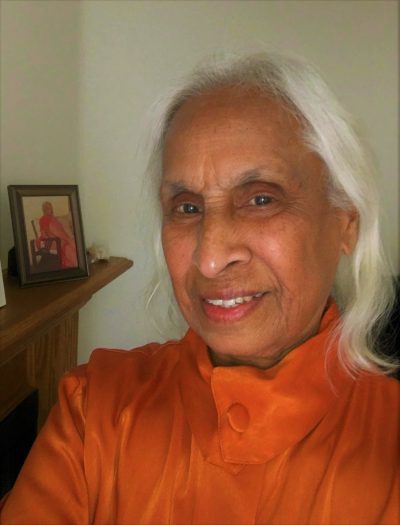Telugu Women writers-19
-Nidadvolu Malathi
The story, “Bhayam”, [Fear of Death] by Tangirala Meera Subrahmanyam throws light on the kind of irrational fears we entertain. It illustrates the unfounded fear of death people experience. It is not a philosophical catechism on death. The author depicts the fear or anxiety that the sight of a dead body causes in people. Fearing one’s own death is understandable. But what is the rationale for fearing the sight of a dead body? The comment of the beggar’s wife at the end that her husband was worth more dead than alive is significant. The story was a powerful statement on the frailties of human nature.
Very often, people from lower strata of society are portrayed as victims. There are a few stories however, which attempt to portray how the working class people feel about themselves and the pride they take in their work. The story, “Ciruchakram” [A Small Wheel] by Nidadavolu Malathi, attempts to illustrate the way a school peon conducts himself in performing his duties and the pleasure he takes in doing so.
Venkanna left his small village with his wife Simmachalam to find a job that was supposed to improve his lifestyle. He took a job as peon in a high school in a small township. His wife was not excited about this move. She would rather stay in their village and be happy with farming the little strip of land they had.
During the annual inspection of the school by the District Educational Officer [deeeyivo saar], the headmaster was a nervous wreck. He was worried that something might go wrong and that could result in loss of funding for the school. He was taking out all his frustration on the peon. Venkanna took all the heat and rose to the occasion each time with extraordinary mettle. He even felt sorry for the headmaster.
Venkanna planted some flowerbeds around the school building, although it was not in his job description. He picked the flowers and gave them to the D.E.O.’s wife. She said, “lovely”; that was a huge treat for Venkanna. He was ecstatic.
The D.E.O. lit up his cigarette, threw the burning matchstick carelessly, and caused to burn a hole in the tablecloth. Headmaster was upset since the tablecloth belonged to him. He blamed Venkanna for no reason. The officer suggested a five rupees fine for the peon. Venkanna did not protest.
After all the hullabaloo was over, Venkanna went home and sat down to enjoy the meal his wife served—rice broth and a piece of pickle—his first meal in two days. He ate the meal while narrating the day’s events with great zest to his wife. The only part he did not tell her was the fine.
Venkanna took pride in the fact that he had done his duty to his satisfaction. He would have no problem sleeping that night.
The story was narrated from the perspective of Venkanna, although not in first person. Implicit is the message that one’s social status has no relevance for one to feel good about oneself and one’s job.
By nature, children are quick to adapt to a code of justice instilled by adults. The strange part is the same adults could change the tune and play to a different drum when it worked against their own interests. The story, “Bamma Rupaayi” [Grandma’s Rupee] by Chaganti Tulasi, depicts this psychology of adults and children about fairness in life.
One day, mother, father and grandmother went out leaving their two daughters and young son at home.
A poor woman and her grandson, Rama Rao, showed up at the door, unaware that the adults were not home. The poor woman told the children that she had met their Baamma at the temple and felt friendly enough to visit them. She came to borrow a little cash to buy school supplies for her grandson.
The little brother and Rama Rao went to the same school. Therefore, he took the initiative and said, “Chinnakka! Remember, father gave a rupee to Baamma”
“Yes, good thing you remembered it. She put three rupees in her book, Bhagavatam,” younger sister replied.
“You’d better not touch that money. Bamma will break both your heads,” the older sister warned them.
“She’ll never break my head. Who do you think I am? Don’t you know I’m given grandfather’s name? That makes me her husband, so to speak. Nothing to worry,” little brother said.
“You should not talk like that, boy,” the poor woman said.
“That’s what my grandmother says, ma’am,” little brother replied politely.
He was determined to help them. He went in and returned with one rupee and a pair of his old half-pants. The two sisters tried to dissuade him, fearing that their parents and Baamma might get mad at them for allowing him to donate the pants and the money.
The poor woman agreed with the two sisters and told the little brother that he must not give away things without his parents’ permission. The little brother would not listen. He insisted that Rama Rao should accept them. The poor woman refused. The little brother took Rama Rao to a side and forced him to accept them.
Later, Bamma and the parents returned home and learned about the incident. Bamma was furious. She yelled at all the three children.
A few minutes later, the poor woman came back with Rama Rao to return the stuff he had accepted earlier without her knowledge. She apologized for her grandson’s indiscretion.
Bamma was surprised at the unexpected turn of events, changed her position, and insisted that the poor woman should keep the pants and the money.
“You were so upset with me for doing the same thing. Why didn’t you take your money back,” the little brother challenged her.
This story has been acclaimed as one of the best stories in Telugu for the touching dialogues and character portrayal, especially of children. A well-known scholar, Ronanki Appalaswamy, stated in his preface to the the anthology that this story ranks in the top quality stories for its psychological insights.
Stories of reflective nature made up only a small percentage of women’s fiction. While some writers wrote only one or two, two writers, Acanta Saradadevi and R. Vasundhara Devi chose poignant subjects for their stories mostly.
*****
(Contd..)


